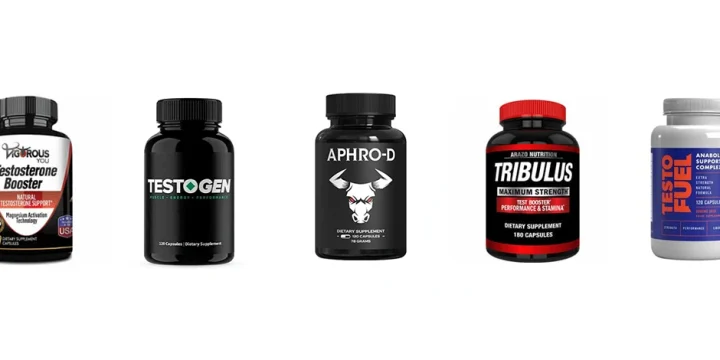Maintaining healthy testosterone levels is often achieved through regular exercise, a balanced diet, stress reduction, and sufficient sleep.
However, in my fitness training experience, many still require testosterone boosters for optimal T-levels and associated health benefits.
Despite the vast array of T-boosting supplements, effectiveness varies, as I've observed in my clients' feedback.
After extensive research to guide my clients better, this article presents my findings on whether testosterone boosters are genuinely effective.
Quick Summary
What Are Testosterone Boosters and How Do They Work?

Testosterone boosters are any synthetic or natural substance that increases testosterone levels.
Generally accepted “normal” levels are in the range of 300–100 nanograms per deciliter (ng/dL). Anything less than 300 ng/dL is considered low testosterone or male hypogonadism, according to WebMD [1].
In a healthy aging male, it is natural for the testosterone level in his body to decrease, usually at a rate of 1-2% per year, as per a 2008 study published in the Clinical Interventions in Aging journal [2].
The symptoms of low testosterone levels can be age-dependent and vary in severity, but in most cases, they include loss of muscle mass, decreased bone density, decreased sexual function, decrease in body hair, depression, etc.
Luckily, there are several options to consider when looking to raise your testosterone level, including testosterone replacement therapy and testosterone-boosting supplements.
Pros and Cons of Testosterone Boosters
You cannot underestimate the importance of natural ways of increasing testosterone, like reducing stress, getting plenty of rest, exercising, specifically high-intensity interval training (HIIT), and eating healthy. I always tell my clients this.
When these aren’t working, you should resort to one of the two options we mentioned earlier: testosterone treatment or natural t-boosters.
“If you have confirmed low levels, and your sexual symptoms are bothersome enough to need treatment, it's reasonable to start testosterone.”
- Dr. Victor Adlin, Endocrinologist
Seeking a doctor’s advice, diagnosis, or treatment is essential before taking any course of action. Usually, a doctor will order a blood test to determine your T levels and use this information to advise you on the next steps.
Testosterone Treatment
As TRT involves hormonal therapy with injectable testosterone, medical patches, or oral capsules, consulting reputable online TRT clinics is crucial for making an informed decision. I always advise this for a well-informed choice.
These clinics offer specialized expertise in testosterone optimization, personalized treatments, and continuous monitoring, ensuring health and well-being are the top priorities.
Without professional oversight, TRT could lead to serious side effects, including cardiovascular or metabolic diseases, as stated in Therapeutic Advances in Drug Safety [3].
Testosterone Supplements

Supplements naturally raise testosterone levels. In my experience, boosters with these ingredients are top-notch for boosting the body's own testosterone:
- D-aspartic acid - a natural amino acid that helps release hormones [4]
- DHEA - a steroid hormone made in the adrenal glands [5]
- Vitamin D - an essential nutrient that affects blood testosterone levels (a 2010 Hormonal Metabolic Research journal study found to significantly increase levels by 13.4 nmol/l (p<0), 6.25 nmol/l (p = 0), and 0.267 nmol/l (p = 0.001), respectively, in bioactive, free, and total testosterone when administered over a year [6]
Related Article: Best Vitamin D Supplements
It is worth noting that using anabolic steroid prescriptions has a purpose when the testosterone level the body naturally produces is deficient [7]. The increased risk of serious side effects or death makes this an inferior option for young, healthy men.
How Long Do Testosterone Boosters Take To Work?
Testosterone boosters' effectiveness can vary widely, with some showing results within two weeks, while others may take several months.
Research in the Phytotherapy Research journal showed fenugreek supplements enhanced libido and muscle strength within six weeks [8].
A study in The Aging Male Journal noted that zinc supplementation helped men with infertility over a period of 1–4 months [9]. However, this study also showed that supplementing with 30 mg/d of chelated zinc for 1-6 months increased testosterone levels from 180 to 222 ng/dl.
An analysis in the European Journal of Endocrinology on testosterone replacement therapy (TRT) in men with hypogonadism revealed that benefits usually appear within 3 to 16 weeks [10].
In general, young adults might experience more pronounced physical changes, while middle-aged and older individuals might benefit more from the mood and energy level improvements. Tailoring usage to age-related needs is key to maximizing benefits.
However, remember that prolonged use of testosterone boosters may also lead to hormonal imbalances, potential impacts on fertility, and even dependency.
So, weighing these risks against the benefits is crucial for informed decision-making.
Recommended Dosage for Testosterone Boosters to Work Effectively
Dosages for testosterone-boosting supplements vary by type.
It's best to consult with a healthcare provider before starting testosterone boosters, especially if you are on medication, to avoid adverse interactions and ensure optimal health outcomes, even if you plan to follow the manufacturer's prescribed dosage.
On the other hand, the dosage for testosterone treatment depends exclusively on the doctor's recommendations.
As for medicated patches, the starting dosage is one 4 mg patch every 24 hours [11]. Injectable testosterone is recommended every 2–4 weeks [12].
Depending on the person's testosterone levels, doctors can change the dosage. It's crucial not to endure testosterone treatments without your doctor's prescription. Consult your doctor if you suspect low testosterone.
Effects of Boosting Testosterone
Testosterone's influence stretches way past the bedroom, majorly impacting overall health. I've seen this time and again in my coaching career.
Here's a quick rundown:
- Reproductive System: Testosterone spikes during puberty, enlarging the testicles and penis for reproductive development. In older men, low levels can hamper fertility.
- Sexual Activity: Essential for libido, low testosterone can cause erectile dysfunction. Boosting it naturally enhances sexual function and bedroom excitement.
- Nervous System: Testosterone influences brain behavior. While high levels may trigger aggression, recommended T-boosters gradually balance them with the stress hormone cortisol for a calmer disposition.
- Skin and Hair: Low levels can lead to hair loss, while boosting them might bring back hair and skin issues like acne. Natural maintenance of T-levels is key.
- Muscle Mass and Fat Storage: Athletes monitor testosterone, as it's vital for muscle building and fat distribution. Low levels can reduce muscle mass and increase fat storage, further decreasing testosterone production.
FAQs
Which Testosterone Booster Is Best?
The best testosterone booster contains ingredients like D-aspartic acid and vitamin D that work naturally with what your body produces.
Are Testosterone Boosters Worth It?
Some people have found testosterone boosters worth it when evaluating benefits versus risks. Age, weight, lifestyle, symptoms, and blood testosterone levels are necessary to consider when determining if the good outweighs the bad for you.
Does Testosterone Boosting Make Men Aggressive?
No, natural testosterone boosting generally doesn't make men aggressive. This is more common with testosterone replacement therapy, especially when done by athletes for a performance boost when they don't have low levels to start with.
What Can Happen When You Stop Taking Testosterone Boosters?
References:
- https://www.webmd.com/men/features/keep-testosterone-in-balance
- https://www.ncbi.nlm.nih.gov/pmc/articles/PMC2544367/
- https://www.ncbi.nlm.nih.gov/pmc/articles/PMC4212439/
- https://www.webmd.com/vitamins/ai/ingredientmono-12/aspartic-acid
- https://www.mayoclinic.org/drugs-supplements-dhea/art-20364199
- https://pubmed.ncbi.nlm.nih.gov/21154195/
- https://www.webmd.com/men/anabolic-steroids
- https://pubmed.ncbi.nlm.nih.gov/21312304/
- https://www.tandfonline.com/doi/full/10.1080/13685538.2019.1573220
- https://www.ncbi.nlm.nih.gov/pmc/articles/PMC3188848/
- https://www.accessdata.fda.gov/drugsatfda_docs/label/2011/020489s025lbl.pdf
- https://www.accessdata.fda.gov/drugsatfda_docs/label/2018/085635s040lbl.pdf
About The Author
You May Also Like






